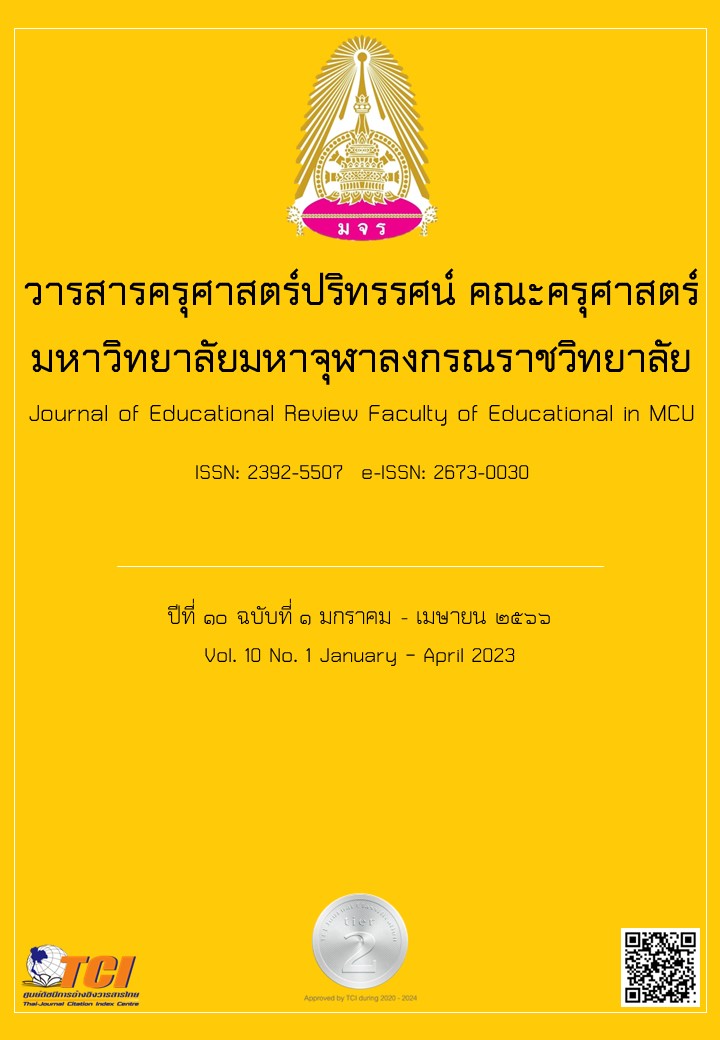A STUDY OF ACADEMIC MANAGEMENT OF HIGHER EDUCATION LEVEL BASED ON THE CONCEPT OF AGILE LEADERSHIP FRAMEWORKS
Main Article Content
Abstract
The study was a documentary-based research. The purposes of this research were to study the conceptual framework of 1) the academic management of higher education level; and 2) Agile Leadership. It is a document research. Data were documentation from seventeen studies related academic management of higher education level which used content analysis and Grouping analysis. The findings areas follows: 1) the conceptual framework of the academic management of higher education level consists of: 1) curriculum development, 2) learning process development, 3) assessment and evaluation, and 4) Research for improve the quality of education; 2) the conceptual framework of Agile Leadership. consists of: 1) Ingenuity, 2) Fast Making Decision, 3) Adaptability, 4) Leadership, 5) The ability to create a teamwork and 6) transparentcy The discussion covered the following: 1) the conceptual framework of the academic management of higher education school of four works because directly in line with academic administration at the higher education level, and 2) the conceptual framework of primary school readiness consists of six domains because It is an overview of the performance in all areas. Academic administration in higher education institutions can develop students to have fluent leadership. to be used in the practice of graduates in the future.
Article Details

This work is licensed under a Creative Commons Attribution-NonCommercial-NoDerivatives 4.0 International License.
ทัศนะและความคิดเห็นที่ปรากฏในบทความในวารสารฉบับนี้ถือเป็นความรับผิดชอบของผู้เขียนบทความนั้นเพียงผู้เดียว และไม่ถือเป็นทัศนะและความรับผิดชอบของกองบรรณาธิการ
กองบรรณาธิการขอสงวนสิทธิ์ในการคัดเลือกบทความลงตีพิมพ์และจะแจ้งให้เจ้าของบทความทราบหลังจากผู้ประเมินบทความตรวจอ่านบทความแล้ว
ต้นฉบับที่ได้รับการตีพิมพ์ในวารสารครุศาสตร์ปริทรรศน์ คณะครุศาสตร์ มหาวิทยาลัยมหาจุฬาลงกรณราชวิทยาลัย ถือเป็นกรรมสิทธิ์ของคณะครุศาสตร์ มหาวิทยาลัยมหาจุฬาลงกรณราชวิทยาลัย ห้ามนำข้อความทั้งหมดหรือบางส่วนไปพิมพ์ซ้ำ เว้นเสียแต่ว่าจะได้รับอนุญาตจากมหาวิทยาลัยฯ เป็นลายลักษณ์อักษร
References
กระทรวงศึกษาธิการ. (2554). มาตรฐานสถาบันอุดมศึกษา. แหล่งที่มา https://graduate.mahidol.ac.th/download/staff/Rule/Group01/Moe16-Th.pdf สืบค้นเมื่อ 3 ก.พ. 2565.
คณะกรรมาธิการขับเคลื่อนการปฏิรูปประเทศด้านการศึกษา สภาขับเคลื่อนการปฏิรูปประเทศ. (2560). รายงาน คณะกรรมาธิการขับเคลื่อนการปฏิรูปประเทศด้านการศึกษา สภาขับเคลื่อนการปฏิรูปประเทศ เรื่อง แผนการปฏิรูปการอุดมศึกษา. แหล่งที่มา http://www.srnpeo.moe.go.th/forms/f_1498302728.pdf สืบค้นเมื่อ 15 ม.ค. 2565.
จามจุรี จำเมือง. (2553). ผู้บริหารกับการบริหารสถานศึกษา. กรุงเทพมหานคร: เจริญดีมั่นคง.
เณริศา อิศรางกูร ณ อยุธยา. (2564). ลักษณะผู้นำแบบ Agile (The Agile Leadership). แหล่งที่มา https://www.mindspringconsulting.com/2021/04/09/ลักษณะผู้นำแบบ-agile-the-agile-leadership/ สืบค้นเมื่อ 20 ธ.ค. 2564.
ธเนศน์ นุ่นมัน. (2561). วิกฤติมหา’ลัย โจทย์ใหญ่ที่ต้องเร่งปรับตัว. แหล่งที่มาhttps://www.posttoday.com/politic/report/546661 สืบค้นเมื่อ 17 เม.ย. 2565.
บุษบา สุธีธร. (2563). การบริหารการสื่อสารภาวะวิกฤตในโลกที่ผันผวน ไม่ชัดเจน ซับซ้อนและคลุมเครือ Managing Crisis Communications in a Volatile, Uncertain, Complex, and Ambiguous World. วารสารนักบริหาร มหาวิทยาลัยสุโขทัยธรรมาธิราช. 2. 130-143.
ปรียาพร วงศ์อนุตรโรจน์. (2553). การบริหารงานวิชาการ. กรุงเทพมหานคร: ศูนย์สื่อเสริมกรุงเทพฯ.
ปองสิน วิเศษศิริ. (2555). เอกสารประกอบการสอนวิชา 2747732 การบริหารงานวิชาการกับการประกันคุณภาพการศึกษา. กรุงเทพมหานคร: จุฬาลงกรณ์มหาวิทยาลัย.
รุ่งชัชดาพร เวหะชาติ. (2550). การบริหารงานวิชาการสถานศึกษาขั้นพื้นฐาน. กรุงเทพมหานคร: มหาวิทยาลัยทักษิณ.
วิฑูรย์ สิมะโชคดี. (2563). คุณภาพคือความอยู่รอด : Agile Leader. แหล่งที่มา https://www.matichon.co.th/article/news_2261787 สืบค้นเมื่อ 15 ม.ค. 2565.
สำนักงานคณะกรรมการการอุดมศึกษา. (2552). กรอบมาตรฐานคุณวุฒิระดับระดับอุดมศึกษาแห่งชาติ พ.ศ. 2552. แหล่งที่มา https://www.acad.nu.ac.th/devcourse/docs/กรอบมาตรฐานคุณวุฒิระดับระดับอุดมศึกษาแห่งชาติพ.ศ.2552 สืบค้นเมื่อ 15 ม.ค. 2565.
อรุณี หงษ์ศิริวัฒน์. (2554). การพัฒนายุทธศาสตร์การบริหารงานวิชาการตามหลักปรัชญาเศรษฐกิจพอเพียง : กรณีศึกษาคณะครุศาสตร์ จุฬาลงกรณ์มหาวิทยาลัย. รายงานการวิจัย. จุฬาลงกรณ์มหาวิทยาลัย.
Adamopoulos, A. (2022). Agile leadership characteristics – 3 core competencies. From https://www.emergn.com/insights/3-core-characteristics-leadership-as-a-function/ Retrieved February 25, 2022.
Codreanu A. (2016). A VUCA ACTION FRAMEWORK FOR A VUCA ENVIRONMENT. LEADERSHIP CHALLENGES AND SOLUTIONS. Regional Department of Defense Resources Management Studies, Brasov, Romania. From https://www.researchgate.net/publication/316967836_A_VUCA_ACTION_FRAMEWORK_FOR_A_VUCA_ENVIRONMENT_LEADERSHIP_CHALLENGES_AND_SOLUTIONS Retrieved December 12, 2021.
Lepsinger R. (2017). What Ford's Billion Dollar Mistake Tells Us About Agile Leadership. From https://www.linkedin.com/pulse/what-fords-billion-dollar-mistake-tells-us-agile-rick-lepsinger Retrieved December 13, 2021.
Mollor, C. (2021). The Future Of Leadership: The Agile Leader. From https://mcgpartners.com/the-future-of-leadership-agility/ Retrieved January 20, 2022.
N. Bushuuyeva, Denis Bushuiev and Victoria Bushuieva. (2019). Agile leadership of managing innovation projects. Innovative Technologies and Scientific Solutions for Industries. 4(10). 77-84.
Puckett, S. (2021). Agile Leadership - a behavior-based competency model. From https://www.agilebusiness.org/news/545710/Agile-Leadership---a-behavior-based-competency-model.htm Retrieved January 25, 2022.
Rainer N., A. T., & Wade. (2017). Redefining Leadership for a Digital Age. International Institute for Management Development. 15. From https://blog.hostalia.com/wp-content/themes/hostalia/images/metaberatung-redefining-leadership-digital-age-informe-blog-hostalia-hosti.pdf Retrieved December 16, 2021.
Yokoi, T. (2020). 4 Agile Leadership Competencies to Outlast Covid-19. From https://www.forbes.com/sites/tomokoyokoi/2020/06/02/4-agile-leadership-competencies-to-outlast-covid-19/?sh=208dd3f46e0c Retrieved December 16, 2021.
Yvette F. (2020). Why agile leadership is key in these uncertain times. From https://techbeacon.com/app-dev-testing/why-agile-leadership-key-these-uncertain-times Retrieved December 16, 2021.


